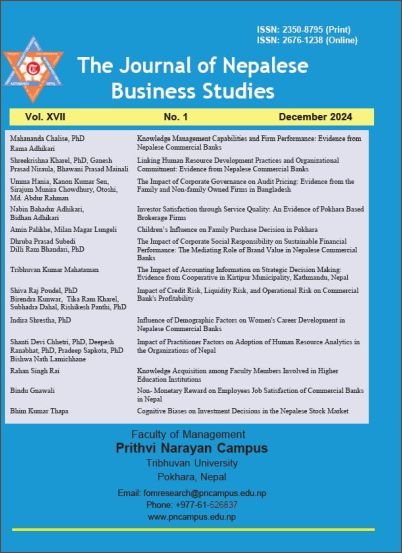Knowledge Acquisition among Faculty Members Involved in Higher Education Institutions
DOI:
https://doi.org/10.3126/jnbs.v17i1.75296Keywords:
Knowledge, knowledge acquisition, faculty members, institutionsAbstract
The primary purpose of this study is to examine the sources of knowledge acquisition by faculty members/instructors in Nepalese Higher Education Institutions (HEIs) concerning two constituent and two community campuses of the hilly region under Tribhuvan University, Koshi Province. Using purposive sampling technique 115 questionnaires were distributed graded on five-point Likert scales and, only 101 were returned, resulting in a response rate of 87.83 percent. To analyze the final net count collected data, basically descriptive statistics, correlation coefficient, multiple regression analysis were used. The relationships between knowledge acquisition (KA) and variables such as books, research journals, training and workshops, information and communication technology (ICT), cultural awareness, experience, and interactive learning were examined through the correlation coefficient. Moreover, multiple regression analyses were performed to test the hypotheses. Additionally, the reliability of the items was measured using Cronbach's alpha. The major findings of the study reveal that books, research journals etc., training and workshop, ICT, experience, and interactive learning significantly contribute to knowledge acquisition. The key contribution of this study could significantly influence policy-making related to the effective management of personnel, finances, and materials (particularly the updated use of information technology) within higher education institutions in Nepal.
Downloads
Downloads
Published
How to Cite
Issue
Section
License
Copyright (c) 2024 Journal of Nepalese Business Studies

This work is licensed under a Creative Commons Attribution 4.0 International License.
This license allows reusers to distribute, remix, adapt, and build upon the material in any medium or format, so long as attribution is given to the creator. The license allows for commercial use.




